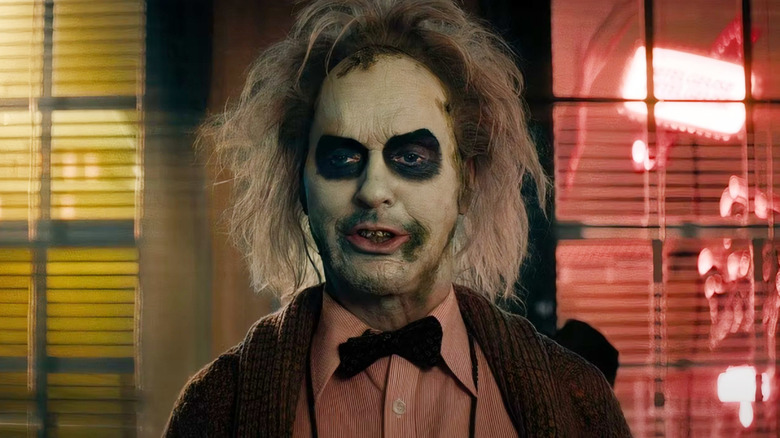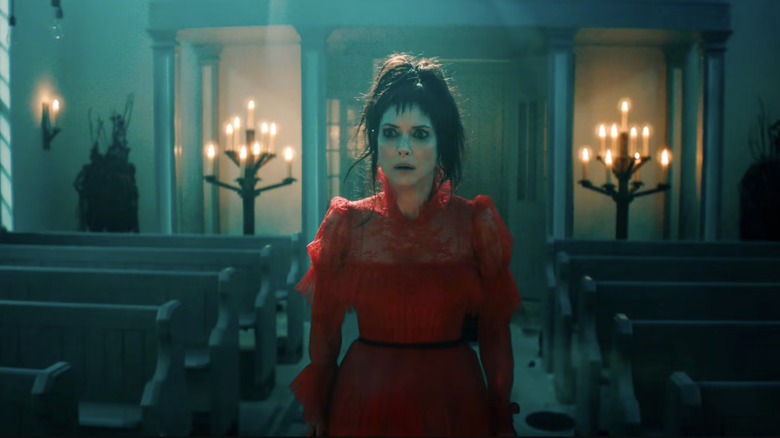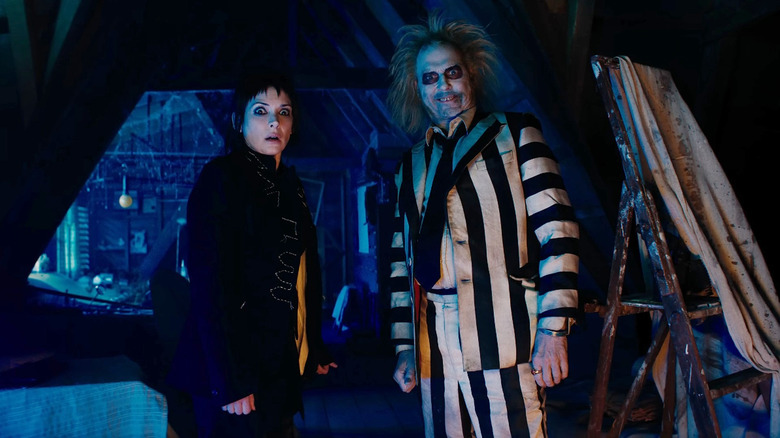This article contains mild spoilers for “Beetlejuice Beetlejuice.”
Ever since the first “Beetlejuice” escalated the obsession the ghostly Maitland couple had with Harry Belafonte to them trying to rid their home of the obnoxious Deetz family by making them do a possession lip sync dance number to “Banana Boat (Day-O),” it seemed like a given that a follow-up setpiece had to happen if “Beetlejuice” ever got a sequel. Of course, follow-ups to gags can be tricky, especially in comedy sequels. Some try to go bigger and wilder, such as the climactic news team battle in “Anchorman 2: The Legend Continues.” Others try and undercut or subvert the expectation, like when Phoebe Cates’ Kate starts delivering a monologue about some trauma that happened to her on Lincoln’s birthday and is cut off in “Gremlins 2: The New Batch.” Others still merely pick up where the bit left off in the first film, as with the “concealed nudity” sequences in the “Austin Powers” sequels.
For “Beetlejuice Beetlejuice,” director Tim Burton approached the dilemma in much the same way he approached the rest of the film, or for that matter, the way he’s approached all his work: by simply doing what struck him as interesting and correct for the moment. Burton’s films may be varied when it comes to their reception by audiences and fans, but he’s always consistently followed his own muse, for better or worse, and his approach to sequels is no different. With that in mind, Burton has long expressed an affection for kitsch, especially when it comes to needle drops in his films. From the Belafonte in “Beetlejuice” to Tom Jones in “Edward Scissorhands” and “Mars Attacks” to scoring a fight scene in “Dark Shadows” to Barry White, Burton loves a good ironic music cue. As such, it’s no surprise that “Beetlejuice Beetlejuice” follows up “Day-O” with a song that might rank as the most kitschy pop single ever released: “MacArthur Park.”
The wild history of MacArthur Park
Sure, I realize dubbing “MacArthur Park” the kitschiest pop single ever is a bold claim. (After all, where does that leave Barry Manilow’s entire catalog?) Yet there’s some merit to this assertion, given the zany history of the song. Written by Jimmy Webb (a singer/songwriter who penned hits for both himself and a plethora of acts that varied from The Supremes to The Highwaymen), “MacArthur Park” was intended as part of a cantata that was inspired by Webb’s breakup with his girlfriend. (Los Angeles’ MacArthur Park was a favorite date destination for the couple.) Originally attempting to get the sunshine pop group The Association (famous for “Cherish” and “Never My Love”) to record the song, Webb was turned down, with Association producer Bones Howe declaring that the song’s metaphorical lyrics and unusual arrangement consisting of several movements made it too strange for the group.
Fortunately for Webb, he met the Irish actor Richard Harris at a fundraising event in 1967. Harris was just coming off of the movie version of the musical “Camelot,” and had expressed interest in making a record all his own. Webb eventually pulled out just the right song to intrigue the expressive performer, and thus the seven minute and 21 seconds of “MacArthur Park” was recorded and released in April 1968 as the first single to Harris’ pop album, “A Tramp Shining.” Sure enough, the odd qualities inherent within Webb’s composition were all present and accounted for, and Harris’ overwrought delivery of the song helped make it an unlikely hit; it had to be heard to be believed.
“MacArthur Park” didn’t easily fade into curio obscurity, however. It got re-recorded by a number of other acts and musicians (including very theatrical renditions by the likes of Frank Sinatra and Liza Minnelli), and became a hit all over again when a disco rendition from Donna Summer was released in September of 1978. A bizarre, lengthy, unintentionally silly and heavily dramatic song being both a sunshine prog pop and disco hit? Of course Tim Burton loves it.
Burton used the song because ‘it just fit the spirit’ of Beetlejuice
Happily, both the Richard Harris and Donna Summer versions of “MacArthur Park” appear in “Beetlejuice Beetlejuice” (along with a small snippet of the song arranged by Danny Elfman at the beginning of the film, in keeping with “Beetlejuice” tradition). Yet, it’s the Harris version that’s featured during the movie’s climax in a grandiose musical number. Given its length, multiple movements and storytelling aspects, “MacArthur Park” lends itself well to scoring a lot of cinematic incident. However, in a roundtable interview attended by /Film’s Jacob Hall, Burton admitted that his choice of the song was more unconscious and matter-of-fact than anything else:
“I have my own bizarre playlist. Everybody has a playlist. So that was on mine. I don’t know, it wasn’t in the script or anything, it’s just something that I felt, I don’t know, it just fit the spirit of it. And it was a song I liked. It was emotional, it was operatic and it’s sort of bizarrely romantic and grand. And so it just felt like given the character of him and his sort of multi-talented, multilingual, whatever […] But that was a beautiful thing. We didn’t really worry about the script or the studio or anybody. We just went and did it. Which is something, like I said, it kind of re-energized the fact of why you like making movies, just kind of it’s the unknown. It’s not something that is set in stone. It’s something that’s, we think about it, but then we just don’t worry about it. We just do it. And it was quite liberating.”
When Hall spoke one on one with Catherine O’Hara, who plays Delia Deetz, the actor echoed Burton’s intuitive feeling that “MacArthur Park” just fit the movie:
“And the whole church and the musical number, when I first heard they were doing the whole song and Tim just came up with so many levels of insanity in that number. And I mean, but real stuff going on too with Lydia and Astrid and us. It’s just wild and great and surprising.”
Both “MacArthur Park” and “Beetlejuice Beetlejuice” are aptly described as “wild and great and surprising,” so it only makes sense that they, unlike Lydia and Beetlejuice, should be married forever.
“Beetlejuice Beetlejuice” is currently playing in theaters everywhere.










